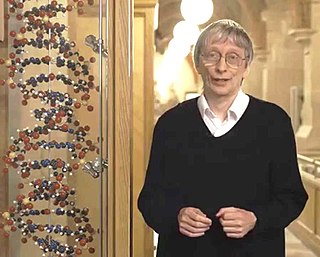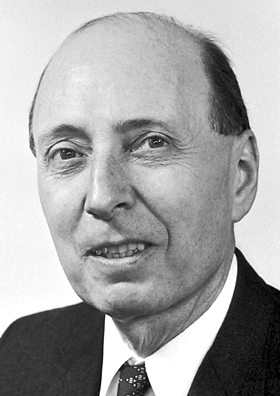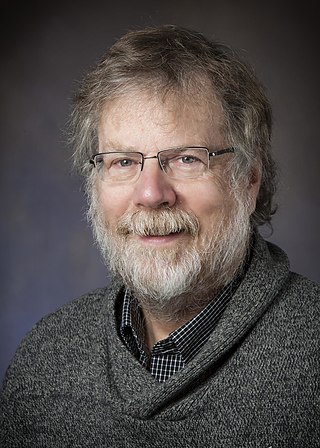
David Elieser Deutsch is a British physicist at the University of Oxford. He is a visiting professor in the Department of Atomic and Laser Physics at the Centre for Quantum Computation (CQC) in the Clarendon Laboratory of the University of Oxford. He pioneered the field of quantum computation by formulating a description for a quantum Turing machine, as well as specifying an algorithm designed to run on a quantum computer. He is a proponent of the many-worlds interpretation of quantum mechanics.

Eugene Paul Wigner was a Hungarian-American theoretical physicist who also contributed to mathematical physics. He received the Nobel Prize in Physics in 1963 "for his contributions to the theory of the atomic nucleus and the elementary particles, particularly through the discovery and application of fundamental symmetry principles".
Chia-Wei Woo, , was the founding president of the Hong Kong University of Science and Technology. His work included raising funding and recruiting outstanding faculty for the university. With Chung Sze Yuen, Woo created an institution, including a top ranked Business School, known as the HKUST Business School. The school's MBA, EMBA and Executive Education programs have been consistently ranked as Asia's top programs, and in the World Top 50 MBA programs by the Financial Times of London. Woo retired in 2001 after 13 years of service and remains President Emeritus as well as University Professor Emeritus.

David Pierre Ruelle is a Belgian and naturalized French mathematical physicist. He has worked on statistical physics and dynamical systems. With Floris Takens, Ruelle coined the term strange attractor, and developed a new theory of turbulence.
Eugene Feenberg was an American physicist who made contributions to quantum mechanics and nuclear physics.
David Pines was a US physicist recognized for his work in quantum many-body systems in condensed matter and nuclear physics. With his advisor David Bohm, he contributed to the understanding of electron interactions in metals. Bohm and Pines introduced the plasmon, the quantum of electron density oscillations in metals. They pioneered the use of the random phase approximation. His work with John Bardeen on electron-phonon interactions led to the development of the BCS theory of superconductivity. Pines extended BCS theory to nuclear physics to explain stability of isotopes with even and odd numbers of nucleons. He also used the theory of superfluidity to explain the glitches in neutron stars.
Democratic rationalization is term used by Andrew Feenberg in his article "Subversive Rationalization: Technology, Power and Democracy with technology." Feenberg argues against the idea of technological determinism citing flaws in its two fundamental theses. The first is the thesis of unilinear progress. This is the belief that technological progress follows a direct and predictable path from lower to higher levels of complexity and that each stage along this path is necessary for progress to occur.
Lev Petrovich Gor'kov was a Russian-American research physicist internationally known for his pioneering work in the field of superconductivity. He was particularly famous for developing microscopic foundations of the Ginzburg–Landau theory of superconductivity. Gor'kov was a professor of physics at Florida State University in Tallahassee, Florida, and a program director in Condensed Matter at the National High Magnetic Field Laboratory. He was one of the Magnet Lab's founding scientists.
Criticism of technology is an analysis of adverse impacts of industrial and digital technologies. It is argued that, in all advanced industrial societies, technology becomes a means of domination, control, and exploitation, or more generally something which threatens the survival of humanity. Some of the technology opposed by the most radical critics may include everyday household products, such as refrigerators, computers, and medication. However, criticism of technology comes in many shades.
Philippe Pierre Gaston François Nozières was a French physicist working at Institut Laue-Langevin in Grenoble, France.
Eugene Galanter (1924–2016) was one of the modern founders of cognitive psychology. He was an academic in the field of experimental psychology and an author. Dr. Galanter was Professor Emeritus of Psychology and Quondam Director of the Psychophysics Laboratory at Columbia University. He was also the co-founder, Chairman of the Board of Directors and Chief Scientific Officer of Children’s Progress, an award-winning New York City-based company that specializes in the use of computer technology in early education. The company's assessments and reports have been used in 40 states and 9 countries.
Patrick A. Lee is a professor of physics at the Massachusetts Institute of Technology (MIT).

David Matthew Ceperley is a theoretical physicist in the physics department at the University of Illinois Urbana-Champaign or UIUC. He is a world expert in the area of Quantum Monte Carlo computations, a method of calculation that is generally recognised to provide accurate quantitative results for many-body problems described by quantum mechanics.
Lev Petrovich Pitaevskii was a Russian theoretical physicist, who made contributions to the theory of quantum mechanics, electrodynamics, low-temperature physics, plasma physics, and condensed matter physics. Together with his PhD supervisor Evgeny Lifshitz and with Vladimir Berestetskii, he was also the co-author of a few volumes of the influential Landau–Lifschitz Course of Theoretical Physics series. His academic status was professor.
Antoine Georges is a French physicist. He is a professor at the Collège de France in Paris and the director of the Center for Computational Quantum Physics at the Flatiron Institute, New York. In 2023, he was elected to the National Academy of Sciences.
Mohit Randeria is a US-based Indian condensed matter physicist and a professor of physics at Ohio State University. Known for his research on condensed matter theory and superconductivity, Randeria is an elected fellow of the American Physics Society. The Council of Scientific and Industrial Research, the apex agency of the Government of India for scientific research, awarded him the Shanti Swarup Bhatnagar Prize for Science and Technology, one of the highest Indian science awards, for his contributions to physical sciences in 2002. He was awarded the 2002 ICTP Prize of the International Center for Theoretical Physics, Trieste and the 2022 John Bardeen Prize.
John Walter Clark, is Wayman Crow Professor of Physics emeritus at Washington University in St. Louis, and a recipient of the Eugene Feenberg Medal in 1987 for his contributions to many-body theory.
John Dirk Walecka, often quoted as J. Dirk Walecka is an American theoretical nuclear and particle physicist. He is a fellow of the American Physical Society and the author of numerous textbooks in physics. Walecka is currently the Governor's Distinguished CEBAF Professor of Physics, Emeritus at the College of William and Mary.

Stefano Fantoni is an Italian theoretical physicist, now retired from the International School for Advanced Studies in Trieste (SISSA), still working in the fields of nuclear physics and low temperature physics.
Fa-Yueh Wu was a Chinese-born theoretical physicist, mathematical physicist, and mathematician who studied and contributed to solid-state physics and statistical mechanics.




